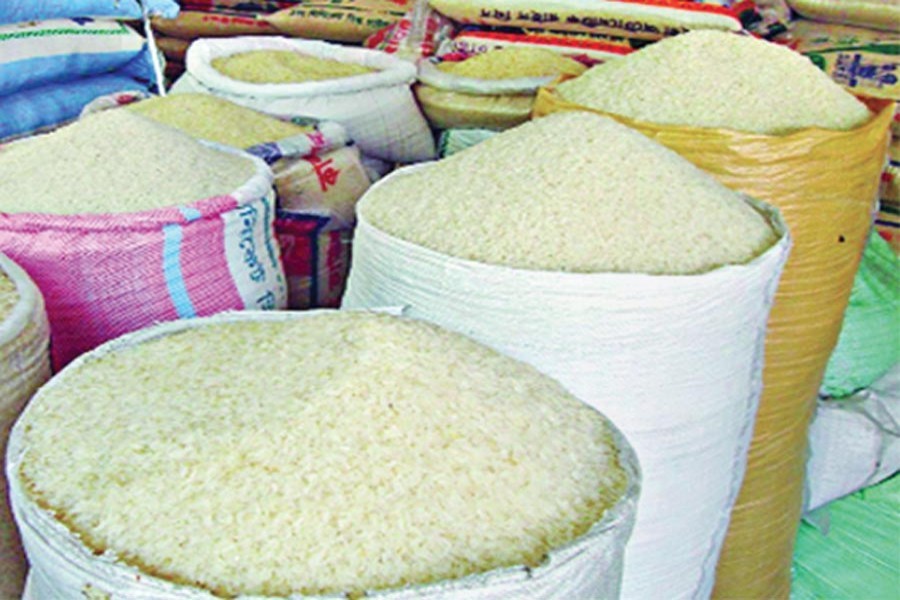Rice prices still remain high despite repeated government efforts to stabilise the market.
But price hike has put extra pressure on the people on limited incomes, raising their cost of living.
Millers and importers shift blame on each other for this hike in peak season of the staple.
To stabilise the rice market, two new cabinet ministers recently pledged to bring rice prices under people's reach within seven days.
Commerce minister Tipu Munshi and food minister Sadhan Chandra Majumder made the commitment at a meeting on January 10.
The FE correspondent found no signs of a fall in rice prices in the city's kitchen markets even after four days of their promise made.
Seasonal coarse rice Swarna and other thick varieties still retail at Tk 40-44 and medium quality Brridhan-28 and 29 at Tk 50-54.
Even finer variety Miniket and Jeerashail now sell at Tk 55-66 and Najirshail at Tk 62-72 a kg.
The prices of all rice varieties increased by Tk 3-5 a kg in the past two weeks.
Rice prices rose by Tk 2.5-3.5 a kg at Babubazar, Badamtoli, Mohammadpur Krishi Market and Karwanbazar wholesale markets during the period.
Prices rose by Tk 150-250 per 50-kg sack in Kushtia, Naogaon, Rangpur, Dinajpur, Nilphamari, Pabna and Jashore mill gates in the past two weeks, according to Bangladesh Auto Major Husking Mill Owners Association.
Rice is rising in prices at a time when farmers had a good yield during ongoing Aman harvest and got an all-time high production last Boro season (April-June).
Aman growers sold paddy at three-year low rate from mid-November to mid-December in last calendar year, according to the Department of Agricultural Marketing.
The Bangladesh Bureau of Statistics (BBS) is yet to estimate the total production of rice in Aman season.
But the overall production is expected to exceed the government target of 1.41 million tonnes in fiscal year (FY) 2018-19, said officials.
Rice production was 36.2 million tonnes in FY '18 against the requirement of 32.8 million tonnes, according to food ministry.
At the same time, rice stocks at public warehouses are now more than 1.08 million tonnes, it said.
Azizul Hoque, a Nilphamari-based miller, said rice prices are being increased at such a high rate by a syndicate of importers and traders.
They have hoarded large quantities of paddy only to manipulate the market by increasing prices.
The import lobby is active to justify the removal of the existing higher import duties, he argued.
Import duty on rice is now 28 per cent.
Mr Hoque said coarse paddy prices increased to Tk 1,500-1,550 per 75-kg sack in January from Tk 1,200-1,250 during the November-December period.
"Apart from millers, the government should monitor the storage of big importers and their affiliated traders to find out the key reason behind this hike," he said.
Sarwar Alam Kajol, a Naogaon-based importer, said importers have no hand in the rice price hike.
Big millers and their allied traders hoarded most of the Aman paddy within last December, he told the FE.
They have been raising the prices of both paddy and rice for lack of an alternative channel.
Mr Kajor said boiled rice import is totally stopped now, excepting import of some white rice.
According to the directorate general of food, the country's rice import declined to just 0.11 million tonnes in the first six months of the current fiscal.
It was more than 2.1 million tonnes in the corresponding period last year.
KM Layek Ali, secretary of the mill owners association, said rice prices might drop within days in city markets.
There is no possibility of further hike, he added.
Mr Ali said Swarna sold at Tk 27.5-28.5 a kg on Sunday at Naogaon, Kushtia, Dinajpur and Nilphamari mill gates against Tk 28-29 seven days ago.


